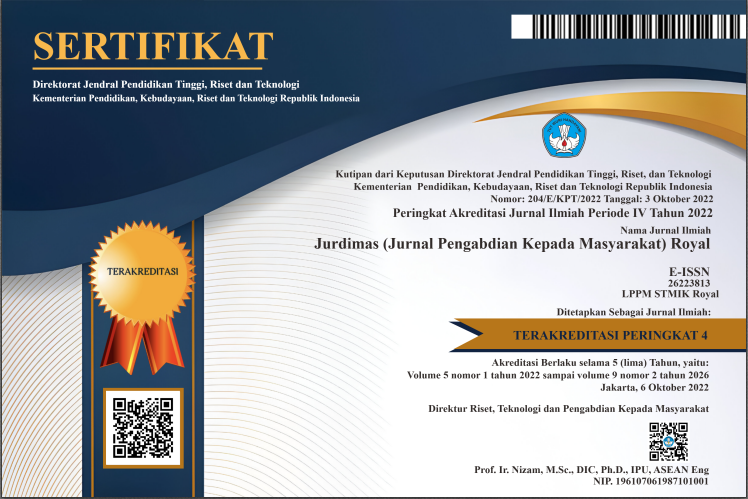Pelatihan Guru Untuk Menciptakan Lingkungan Belajar Yang Suportif Dan Menyenangkan Di Lingkungan YPKI Magelang
Abstract
Abstract: This community service (PkM) aims to provide training for teachers on how to create a supportive and fun learning environment for students in their classrooms. This PkM was carried out offline on Wednesday, 15 November 2023, at 9.00-12.00 WIB. The main participants of the training were 33 teachers, consisting of two teachers of Learning Group for toddlers (KB), six teachers of Kindergarten (TK), ten teachers of Elementary School (SD), seven teachers of Junior High School (SMP), and eight teachers of Senior High School (SMA) in Yayasan Perguruan Kristen Indonesia (YPKI) Magelang. In the presentation session, the author discussed five main principles to help the PkM participants in creating a supportive and fun learning environment, namely: 1) using technology to make learning interesting and fun; 2) taking sufficient time to guide students to practice new learning materials; 3) making rules regarding how students should communicate and act; 4) creating supportive friendship groups; and 5) scheduling teacher professional development meetings in the school to learn from each other and share knowledge. The session concluded with a discussion with the PkM participants, implying that teachers must take an active role to create a supportive environment for their students.
Keywords: learning environment; learning; teaching; technology
Abstrak: Pengabdian kepada Masyarakat (PkM) ini bertujuan untuk memberikan pelatihan untuk para guru tentang bagaimana menciptakan lingkungan belajar yang suportif dan menyenangkan untuk para siswa mereka di dalam kelas. Kegiatan PkM ini dilaksanakan secara luring pada hari Rabu, 15 November 2023, jam 09.00-12.00 WIB. Peserta utama pelatihan ini adalah 33 orang guru, yang terdiri dari dua orang guru KB, enam orang guru TK, sepuluh orang guru SD, tujuh orang guru SMP, dan delapan orang guru SMA di bawah naungan Yayasan Perguruan Kristen Indonesia (YPKI) Magelang. Di dalam sesi pemaparan materi, penulis membahas lima prinsip utama untuk membantu para peserta PkM dalam menciptakan lingkungan belajar yang supotif dan menyenangkan tersebut. Kelima prinsip tersebut adalah: 1) menggunakan teknologi untuk membuat pembelajaran menjadi menarik dan menyenangkan; 2) meluangkan waktu yang cukup untuk membimbing siswa berlatih materi pembelajaran yang baru; 3) membuat peraturan terkait bagaimana siswa harus berkomunikasi dan bertindak; 4) membuat kelompok pertemanan yang saling mendukung; dan 5) menjadwalkan pertemuan pengembangan profesionalitas guru di sekolah untuk dapat saling belajar dan berbagi ilmu pengetahuan satu sama lainnya. Sesi diakhiri dengan diskusi dengan para peserta PkM yang menyiratkan bahwa guru harus berperan aktif dalam menciptakan lingkungan yang mendukung bagi siswa mereka.
Kata kunci: lingkungan belajar; pembelajaran; pengajaran; teknologi
References
Crawford, J., Cowling, M., & Allen, K. A. (2023). Leadership is needed for ethical ChatGPT: Character, assessment, and learning using artificial intelligence (AI). Journal of University Teaching and Learning Practice, 20(3), 1–19. https://doi.org/10.53761/1.20.3.02
Elias, M. J. (2021). How SEL can help make schools feel more inclusive. Edutopia. https://www.edutopia.org/article/how-sel-can-help-make-schools-feel-more-inclusive
Hoi, V. N. (2022). A synergetic perspective on students’ perception of classroom environment, expectancy value belief, and engagement in an EFL context. Language Teaching Research, 00(0), 1–25. https://doi.org/10.1177/13621688221075781
Khanh, L. C. (2024). Teachers’ roles on English language teaching for promoting learner-centered language learning: A theoretical review. International Journal of TESOL & Education, 4(2), 78–98. https://doi.org/10.26456/vthistory/2024.4.060-075
Lokollo, N. C. E., & Mali, Y. C. G. (2024). Speak more, students! Harnessing technology for active students’ engagement in EFL English-speaking classes. OKARA: Jurnal Bahasa Dan Sastra, 18(1), 36–53. https://doi.org/10.19105/ojbs.v18i1.12653
Mali, Y. C. G. (2023). The exploration of EFL teachers’ technological practices in Indonesian schools. Journal of English Teaching and Learning, 6(2), 153–168. https://doi.org/10.21043/jetli.v6i2.22298
Mali, Y. C. G. (2024a). EFL graduate students’ voices on their technology-integrated classroom language tasks. LLT Journal: A Journal on Language and Language Learning, 27(1), 116–135. https://doi.org/https://doi.org/10.24071/llt.v27i1.7375
Mali, Y. C. G. (2024b). Theoretical perspectives of integrating technology into English language teaching and learning. Elsya: Journal of English Language Studies, 6(2), 151–160. https://journal.unilak.ac.id/index.php/elsya/article/view/17925/6333
Mali, Y. C. G. (2025). Pelatihan penggunaan teknologi sederhana untuk pengajaran dan pembelajaran Bahasa Inggris. Jurnal Pengabdian Untuk Mu NegeRI, 9(1), 104–111. https://doi.org/https://doi.org/10.37859/jpumri.v9i1.8560
Mali, Y. C. G., Bantawtook, P., He, H., Morrison, S. J., & Salsbury, T. L. (2022). The exploration of a Korean EFL student’s motivational factors over a yearlong intensive English program. Korea TESOL Journal, 17(2), 109–134. https://koreatesol.org/sites/default/files/pdf_publications/KTJ17-2web_0.pdf
Mali, Y. C. G., & Salsbury, T. L. (2022). An associate professor and a doctoral student learn from each other: Critical friendship. Electronic Journal of Foreign Language Teaching, 19(1), 52–68. https://doi.org/https://doi.org/10.56040/msaa1914
Mali, Y. C. G., & Santosa, M. H. (2021). Screencast-O-Matic to support EFL teaching and learning amidst the COVID-19 pandemic. Beyond Words, 10(2), 81–90. https://doi.org/10.33508/bw.v9i2.3360
Peachey, N., & Crichton, R. (2024). AI activities and resources for English language teachers. British Council. https://www.teachingenglish.org.uk/sites/teacheng/files/2024-11/Peachey_2024_ AI_activities_resources_English_language_teachers.pdf
Ragawanti, D. T., & Mali, Y. C. G. (Eds.). (2023). Teaching English language skills for university EFL students: From theory to implementation. Uwais Inspirasi Indonesia.
Son, J.-B. (2020). Technology-enhanced language teaching in action (J.-B. Son (Ed.)). Asia-Pacific Association for Computer-Assisted Language Learning (APACALL). https://www.apacall.org/research/books/5/TELT_Action_2020.pdf
Wiebe, N. G., Pratt, H. L., & Noël, N. (2023). Writing retreats: Creating a community of practice for academ-ics across disciplines. Journal of Re-search Administration, 54(1), 37–65. https://files.eric.ed.gov/fulltext/EJ1390793.pdf
Wijaya, K. F. (2024). Promoting emo-tionally supportive classrooms to enhance EFL learners’ positive emotions. Malaysian Journal of ELT Research, 21(2), 1–16. https://doi.org/10.52696/mofj2230














